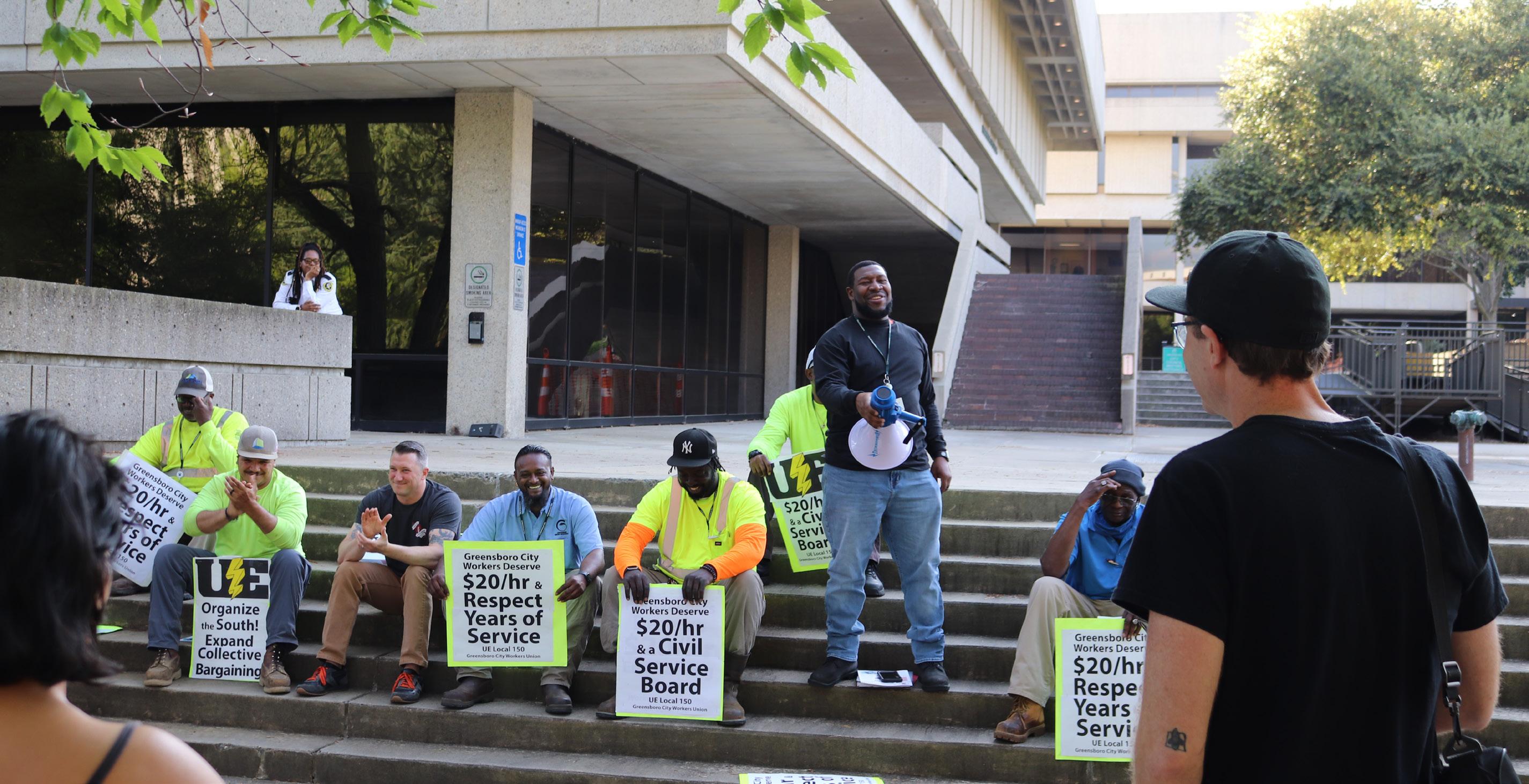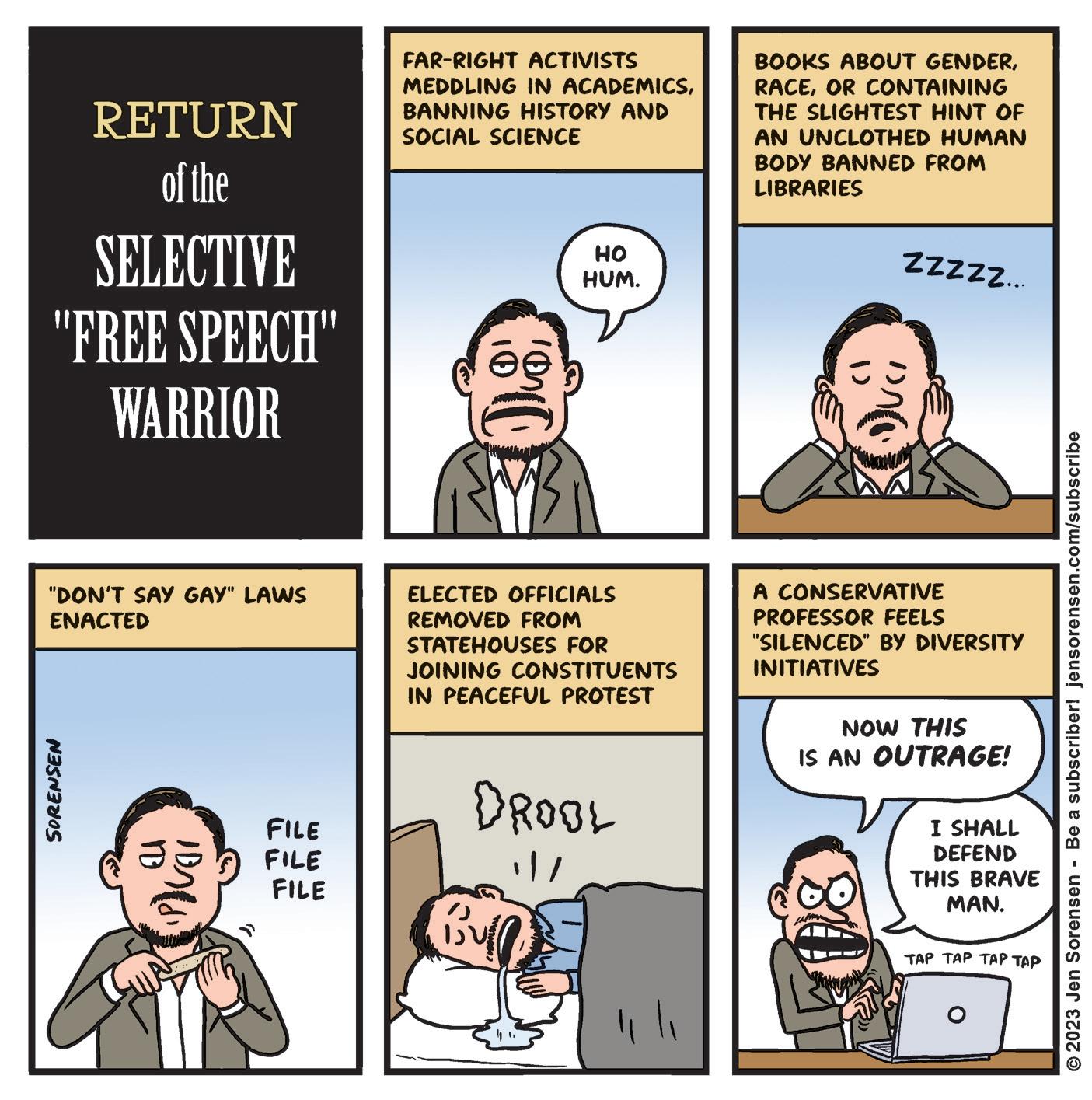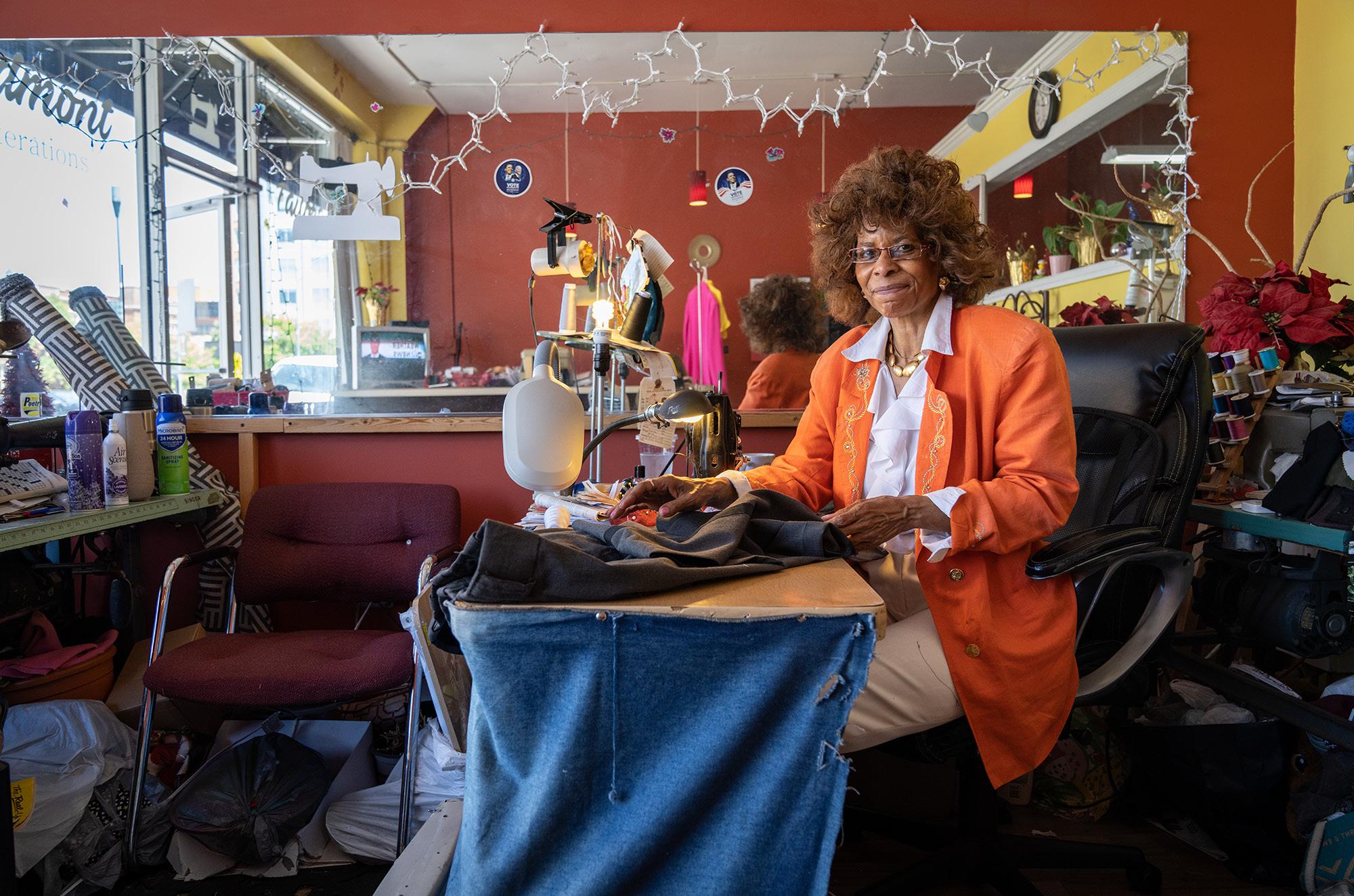






THURSDAY MAY 11
Beer Release: Tire Pump Sour Wheat

Ale @ Brown Truck Brewery (HP) 4 p.m.
Brown Truck Brewery invites you to try its new sour American wheat ale. Tire Pump is described as “full-bodied, smooth and tangy” and comes in five flavors: blueberry, blood orange, Jamaican rum, coconut cream or passionfruit. More info on the Facebook event page
#BYOV — A Sexual Health Event @ Adam & Eve (GSO) 6 p.m.
Join a panel of healthcare professionals for a casual discussion where your questions regarding sex, libido and more will be answered. Snacks and door prizes will also be available. Register at forms.gle/hXy4aLfcG2hX1Zi49
FRIDAY MAY 12
Huskies & Malamutes Takeover @ Doggos Dog Park & Pub (GSO) 7 p.m. This takeover’s for the howling doggos. Huskies, malamutes and mixed breeds are invited to a night of socializing while their owners enjoy a
 by MICHAELA RATLIFF
by MICHAELA RATLIFF
drink. Head to doggosparkandpub.com to view the house rules.
Rehearsals @ Stained Glass Playhouse (W-S) 8 p.m.
Stained Glass Playhouse presents Rehearsals by Kernersville playwright Bill Cissna. Wilmertown Community Theatre is preparing its production of Oscar Wilde’s An Ideal Husband, but “feuds and flirtations among the cast, no budget” and other inconveniences make it almost impossible. Visit stainedglassplayhouse.org/rehearsals for more information and to purchase tickets.
SATURDAY MAY 13
Sit-Ins, Drive-Ins and Uncle Sam discussion with Bill Slawter @ Barnes & Noble (GSO) 11 a.m.
Join author Bill Slawter for a discussion of his book Sit-Ins, Drive-Ins and Uncle Sam, a memoir-based history of Greensboro in the 1960s. A book signing will follow.
The Art of Laughter: A Comedy + Art Showcase Mother’s Day Edition @ Milton Rhodes Center for the Arts (W-S) 7:30 p.m.
Arts Council of Winston-Salem & Forsyth County is hosting the Art of Laughter, a quarterly comedy show and Mother’s Day celebration featuring Corey “Mr. Petty” Jones and Larry “LB the Poet” Barron. Also enjoy all-woman comedian lineup B Tina B, Tara Sharpe and Ayeshia Ayeshia. Find more information and purchase tickets at intothearts.org
SUNDAY MAY 14
Mother’s Day Market @ Wise Man Brewing (W-S) 1 p.m.
Wise Man Brewing in partnership with Catbird Art & Events and Angelo’s Artisan Market is hosting its 6th annual Mother’s Day Market perfect for purchasing a handmade gift to celebrate a special someone in your life. Check the event page on Facebook for updates.

Spring Awakening @ Congregational United Church of Christ Greensboro (GSO) 2 p.m.
Veterans Appreciation Night @ Truist Point (HP) 6:35 p.m.

The High Point Rockers are hosting their annual Veterans Appreciation Night where veterans can receive up to four complimentary game tickets with military ID. Gates open at 6. Purchase tickets at highpointrockers.com
Triad Pride Acting Company presents 8-time Tony Award winner Spring Awakening, which follows a group of students in late 19th Century Germany as they come of age and explore sexuality and self-discovery. Find more information and purchase tickets at triadprideperformingarts.org
Find more events and add your own to our calendar at triad-city-beat.com/local-events

For more information, scan the QR code or email chris@triad-city-beat.com.

THE TRIAD’S LOCAL EVENT TICKETING PLATFORM POWERED BY TRIAD CITY BEAT
TCBTix is the local ticketing platform created exclusively for Triad-area community events. It’s free, easy to use, and fully customizable with all-access ticketing features to meet your event’s unique needs.
BUSINESS
PUBLISHER/EXECUTIVE EDITOR


Brian Clarey brian@triad-city-beat.com
PUBLISHER EMERITUS
Allen Broach allen@triad-city-beat.com
OF COUNSEL
Jonathan Jones
EDITORIAL
MANAGING EDITOR
Sayaka Matsuoka sayaka@triad-city-beat.com
CITYBEAT REPORTER
Gale Melcher gale@triad-city-beat.com
1451 S. Elm-Eugene St. Box 24, Greensboro, NC 27406 Office: 336.681.0704
SALES
KEY ACCOUNTS


Chris Rudd chris@triad-city-beat.com
AD MANAGER
Noah Kirby noah@triad-city-beat.com
CONTRIBUTORS
Carolyn de Berry, John Cole, Owens Daniels, James Douglas, Michelle Everette, Luis H. Garay, Destiniee Jaram, Kaitlynn
Havens, Jordan Howse, Matt Jones, Autumn Karen, Michaela Ratliff, Jen Sorensen, Todd Turner
TCB IN A FLASH @ triad-city-beat.com
First copy is free, all additional copies are $1. ©2022 Beat Media Inc.
WEBMASTER
Sam LeBlanc
ART
ART DIRECTOR
Aiden Siobhan aiden@triad-city-beat.com
COVER:
Design by Aiden Siobhan
fantasize about leaving the United States on a not-so-infrequent basis. I think about what it would be like to move to Japan, to be among my people. Or even to just move up to Canada.
Ibusiness, it was the fact that they sold reprehensible products on their website and they had a stand at the state-owned Piedmont Triad Farmers Market.
by Sayaka MatsuokaBut then I ground myself back in reality. I ground myself in the history of struggle that my parents endured to raise me and my sister here in an increasingly inhospitable place. I imagine the decades of misunderstood conversations; the outright racist remarks; the blood, sweat and tears of running a business.

I am a child of this country. I was born here, raised here, have cried, laughed, yelled, fought here.
So when I see narrow-minded, hate-filled people who actively seek to destroy the most marginalized people in our community calling themselves “patriots,” it pisses me off.
About a day ago, I was tagged in a Facebook post about a local business called Patriot Candle Co. that sells candles and other custom-made gear in the area. The issue wasn’t the name of the
I won’t describe the stuff they sell because it’s outright offensive, but it targeted immigrants and the trans community to name just two. According to the manager of the market, Daniel Johnson, the vendor is no longer allowed to sell at the market after multiple complaints were filed.
“Their privilege to be a vendor here has been permanently revoked,” Johnson said on Tuesday.
The vendor and others who align with their hateful views will call this move by the market “silencing” and part of the “woke agenda.”
But I’m here to tell them that we are the patriots of this country and that we belong here.
Some of us are here because we were born here after our parents came seeking a better life for us. Others are here because they were forcefully removed from their homes and brought here. Still others have always been here and continue to fight for reclamation of their home. We don’t have to fly flags to be patriots.
Because as flawed as America is, has been and will continue to be, it is ours, not just yours.
When I see narrow-minded, hate-filled people calling themselves ‘patriots,’ it pisses me off.
They don’t understand drag, so they market it as threatening to the ‘American’ family with their traditional conservative values, and let the system work as it always has.
Brenda the Drag Queen, pg. 12
Renovations for Crystal Towers are underway, marking the latest update for the historically under-resourced public housing facility for seniors in Winston-Salem. Asbestos was removed from the building late last week, according to Kevin Cheshire, the executive director of the building’s owner, the Housing Authority of Winston-Salem.
Asbestos is a carcinogenic mineral that is resistant to heat, electricity and corrosion. It can become dangerous if the fibers in the material are disturbed, and it must be properly removed. If disturbed, the fibers can become airborne, enter the lungs and cause tissue scarring and cancer, according to the National Cancer Institute. The asbestos was found in the flooring of the building according to Cheshire, who spoke with TCB on Monday.
Crystal Towers residents have long voiced their concerns about management and failing amenities like the often broken-down elevators and flooded laundry facilities. After nearly selling the building, HAWS announced in early 2022 they would retain ownership of the building and start repairs.
According to the city’s website, the purpose of HAWS is to “provide safe and sanitary dwelling accommodations for persons of low income.” HAWS has a board of commissioners comprised of nine members. Full board meetings are held at 12 p.m. on the second Tuesday of each month, and members’ terms are five years.
Cheshire told TCB that EME Industrial Services, a demolition service that removes contaminants such as lead, mold and asbestos, assisted with the flooring removal.
Residents who spoke to TCB on Sunday were either unaware of the asbestos removal or had concerns about how it was being removed and unsure of where it was located.
TFor years, residents have been lamenting the lack of reliable elevators within the 11-floor building. Many of the residents are senior citizens and need access to the elevators to move freely within the building or to leave.
A causal factor is that the laundry facilities on each floor have been leaking, causing damage to elevator components. To alleviate this issue, contractors are working on centralizing the laundry facilities to the ground floor

and updating the lobby. Multiple layers of floor tile on the ground floor were pulled up to put down new flooring late last week. Cheshire noted that the old flooring was tested before it was torn up, and that it had “less than 3 percent of asbestos-containing materials.” The adhesive mastic affixing the tiles also had asbestos in it. Cheshire told TCB that EME Industrial Services, a demolition service that removes contaminants such as lead, mold and asbestos, assisted with the flooring removal.
Other renovations include the replacement of some elevator parts with the goal of replacing the elevators entirely in the future. Cheshire told TCB on Monday that they were receiving parts for the new elevators that day.
“That building — needless to say — is old,” Cheshire said. “It’s got a lot of failing systems.”
In terms of overall repairs to the building, Cheshire said that the city doesn’t have “sufficient funding” to “address the capital need of our public housing stock.”
As reported by TCB in the past, the decision not to sell the building was largely influenced by the $30 million Choice Neighborhood Grant funding the city received in 2020. However, in a text to TCB, Cheshire wrote that none of that funding is going toward Crystal Towers, and that the grant was for “Cleveland Avenue Homes only.”
The Winston-Salem Chronicle — the city’s Black community newspaper — reported in December 2022 that city and HAWS officials came together to break ground on the project, noting that much of the grant will go toward replacing public housing units with mixed housing and single-family homes.
Regarding funding for Crystal Towers renovations, Cheshire said he wasn’t sure how much they would get from the city.
“[The] city has committed to work with us to make the upgrades, but we do not have a figure on that need yet,” he said, adding that they anticipate having that number by the end of the year. “[W]e do not know how much of that need the [c]ity will fund.”
Removing the asbestos and next steps
onstruction of Crystal Towers began in 1971 and the downtown high-rise contains around 200 units, housing mostly low-income elderly residents. Asbestos is often a concern in older buildings like Crystal Towers when it was still used in building materials. Asbestos was widely used in construction until the 1970s, and some home insulation and other building materials produced before 1990 contain asbestos. A Washington Post article from 1978 revealed that some of the nation’s largest asbestos companies concealed evidence about the devastating effects of asbestos exposure on millions of US workers for decades. The uses of asbestos are now restricted but not fully banned.
Cheshire said that EME Industrial Services ran negative air machines, which clean the air on job sites and in confined spaces with substances such as asbestos. He added that the company used a bonding agent so that the asbestos would not become airborne or “friable.”
Cheshire said that the next step will be to assess the other issues and try to secure funding to solve them.
“That’s sort of down the road later this year, early next year,” he said, adding that they hope to complete the current projects in the next two or three months.
TCB spoke with Wesley Hamm, project manager at EME Industrial Services, who confirmed Cheshire’s description of the process.
The floor material was “non-friable,” Hamm said.
“If you can’t pulverize it in your hand that means it’s non-friable,” Hamm explained. “Stuff that’s friable would be like popcorn-textured ceiling, pipe insulation, stuff like that…With a floor tile you can’t really crush it in your hand because it’s so thick.”
While the company did not shut down the HVAC system during the process, they did place a thick plastic covering over the return ducts. Hamm said that this is allowed by the state, and added that a third-party air monitor came in and collected air samples to make sure that it was safe.

According to the American Cancer Society, if building materials that contain asbestos such as older insulation and ceiling and floor tiles “begin to break down over time, asbestos fibers can be found in indoor air and may pose a health threat.”
“The air monitor has a license from the state of North Carolina. He brought his pumps in to run air samples and he took them to the lab and they read them, and they certified that the air was clean,” Hamm said.
A few social media posts circulated last week raised concerns over the presence of asbestos and cited workers who appeared to not be wearing protective equipment or wearing masks. Hamm said that this was when employees were still moving equipment in and out.

“Once the abatement starts they have to put on a suit and a respirator,” Hamm said.
“We know how to safely handle asbestos and follow the regulations that are set forth by the state of North Carolina,” Hamm said.
On May 1 and May 2 respectively, Winston-Salem and Greensboro city councils voted on a resolution to oppose HB 470, a bill that would create a civil service board for each city if passed by the state legislature. City workers who have been cited for termination, suspended or demoted could appeal to the civil service board even after the city managers make their final decisions. It outlined the possibility for appeal hearings, granting additional job protections for city workers.
A civil service board would also open up proceedings to the public eye. In accordance with the Open Meetings Law, the meetings could be recorded and viewed by the public.
The bill had support from local House members, and was sponsored by Rep. Jeff Zenger (R-Forsyth), House Whip Jon Hardister (R-Guilford) and Rep. Kyle Hall (R-Forsyth)
Members of both councils have criticized the bill and questioned its necessity; Greensboro’s council voted 5-3 to pass their resolution against the bill, while Winston-Salem’s resolution passed unanimously.
Greensboro Mayor Nancy Vaughan and council members Zack Matheny and Tammi Thurm voted to oppose the resolution against the bill. Council member Hugh Holston was absent.
The purpose of the cities’ resolutions was to send a message of disapproval to the state legislature regarding the bill.
Most recently, the bill was referred to the Senate Committee on Rules and Operations on April 27.
In an interview with TCB, Greensboro’s Mayor Pro Tem Yvonne Johnson,
who voted to oppose the bill, said, “We need, as a council and a city, to fix this problem…. We don’t have a system to fix it. We need to establish that. That’s what I want to work on.”
Winston-Salem’s representative for the West Ward and sole Republican on the council Robert C. Clark opposed the bill, telling TCB that his concern was that the “legislator never spoke to the city,” claiming that they “did not take our phone calls.”
“I think this is a topic that… interested parties need to sit down and work it out,” Clark said, adding that he’d be “happy to sit down with anyone that wants to, and we’ll chat about it.”
Council members in favor of the bill echoed concerns from city employees. During Greensboro’s May 2 council meeting, Vaughan said that she thinks workers “should be able to make sure that policy and procedure was followed” when they are being fired, demoted, suspended etc.

Both city councils have pushed the narrative that this is a “bad bill,” in the words of Winston-Salem Mayor Pro Tempore Denise D. Adams during the May 1 city council meeting. Greensboro council member Sharon Hightower took issue with the possible makeup of a civil service board, noting that the way the bill is currently written, that city council would only get to appoint one representative.
“Currently, council will only get one appointee,” Hightower said. “We’ve got nine people up here with nine different opinions of who we want on that board.”
Workers with the city of Greensboro rally outside of the municipal building before an April 4 city council meeting. PHOTO BY GALE MELCHERGreensboro and Winston-Salem council members raised concerns that some of the city manager’s authority could be taken away. Winston-Salem City Manager Lee Garrity also pushed back against the bill.
“I don’t think there’s a terrible problem with our current system, but we have identified some things that can be… improved,” Garrity said during the May 1 council meeting.
“The process takes too long. No employee should have to wait weeks and months before they find out, particularly if they’ve been suspended without pay,” Garrity acknowledged, adding that the city is going to “institute a very strict rule, it’s coming with the budget… that will hold all of us accountable if we don’t meet a much faster turnaround time for grievances.”
Before Garrity’s commitment to addressing the city’s grievance procedure, Winston-Salem’s Southwest Ward representative Kevin Mundy expressed uncertainty over whether to join other council members in a united front against the bill.
Mundy said that he was concerned about not having “anything in place” to address city workers’ concerns about grievance procedures if the bill does not pass. Mundy said that workers have been bringing it to the city’s attention “for at least two-and-a-half years,” noting the length he’s been in office.
“At this time that we are so concerned about recruiting and retaining police officers and firefighters this is one of their biggest concerns that they’ve been bringing to us over and over,” Mundy said. “Until I have some kind of commitment from our city management staff, I can’t vote in favor of sending to the state legislature a document that says, ‘I don’t wanna pass this state [legislation],’ because after that there’s no safety net for these folks.” Adams acknowledged that the city had made mistakes in the past but asked: “Give us a chance to fix it.”
Council members from both cities seemed blindsided at the speed in which the bill passed through the legislature.
n March 23, HB 470 was filed in the state House, where it recently passed. It is now being heard in the state Senate.
A considerable turnout of city workers, union representatives and supporters showed up to the April 4 Greensboro City Council meeting, rallying on the plaza steps outside Melvin Municipal Building before attending the meeting inside. Several city workers like local union UE150 Vice President Bryce Carter addressed their desire for a $20/hr minimum wage and a civil service board during the public comment period.
Hightower questioned whether it was fair that union members could potentially be elected to the board and speak for non-union members “I don’t think so,” Hightower said, adding that she felt the bill was “done in the dark.”
“You’re gonna have members on this board who are gonna represent a union,” she said. “Do they have HR experience? Do they have policy knowledge? Do they have legal knowledge? You’re putting that in the hands of novice people that don’t have that.”
Many city workers and supporters of the bill spoke during the May 2 public hearing on the matter.
“Very few organizations are devoid of discrimination, historically,” said Marcus Cox, executive board member of Professional Fire Fighters of Greensboro, a labor organization representing the city’s firefighters. “If a decision is
made that directly affects an employee’s career or livelihood, transparency on how that decision is made should be accessible.”.
City workers in Greensboro have been dissatisfied with the city’s grievance procedure for years, as noted by Carter. A Facebook post by local union UE150 shows a picture from the 1970s of fired Greensboro sanitation workers who were fighting for reinstatement. The workers are shown standing outside the Carolina Peacemaker, the city’s African American community newspaper established in 1967.
“The campaign for a Civil Service Board is part of a long history of majority-Black city workers being terminated without a chance to [be] heard,” the post reads.
During the May 2 city council meeting, Carter said that workers are pushing for the civil service board because they believe it would aid worker representation during the process by allowing them to share evidence that could be important to their case rather than being dismissed without a chance to share their side of the story.
“It’s all about policy,” Carter said, adding that the board could help address inconsistencies in firing.
If passed, the bill would amend both cities’ charters to allow for a civil service board that would consist of five members.
Board members’ terms would last two years, and members must be qualified voters of the city and cannot be employed by the city or serve on city council. One member would be selected by each city council during a council meeting and another member would be chosen by the mutual agreement of the city’s police and fire chiefs.
Two members would be elected by members of the classified service of the city — which includes all officers and employees of the city except the city manager, department directors and their assistant directors, the city clerk, fire and police department leadership, or officers elected by the people. The election for these two members would be held on a normal city workday, and the last board member would be selected by majority vote of the four other members already selected. If a member is not elected by majority vote of the four other members, city council would appoint a member to the board.
The board may create and amend rules, and submit them to the city council for approval.
Any member of the classified service of the city who desires a hearing can file a request with the city clerk within 10 days after learning of the action that they take issue with. The grievance procedure should conclude within 30 days.
Within 10 days after the conclusion of the hearing, the board would submit their decision in writing. If the board determines the action was not justified, they would order to have it rescinded.
Within 10 days of receipt of the board’s decision, either party may appeal to the county’s Superior Court for a trial de novo, which would be a new trial on the entire case.
While city leaders in Greenboro and Winston-Salem have pushed back on this idea, other cities in the state already have civil service boards.
Asheville’s board has two city council appointees and two members elected by the classified service, with one member appointed by those four members. The city of Charlotte has a board of nine members — three appointed by the mayor and six appointed by the city council.
Very few organizations are devoid of discrimination, historically.
Marcus Cox
“ “
Last week in the North Carolina Legislature, an abortion bill was hastily drawn up and brought to a vote through a little-used parliamentary procedure last utilized to fast-track HB 2, the disastrous Bathroom Bill that cruelly targeted trans North Carolinians and will have cost our state approximately $3.76 billion by 2028 in lost revenue from tourism, film shoots, business expansions and sporting events.
Helping to usher this unpopular bill through the House was unpopular Rep. Tricia Cotham, who switched parties just in time to initiate a spectacular ripple effect of which the abortion bill is just a small part.
But it may be the most egregious.
Remember, in January, four months ago, she co-sponsored a bill that would have made the protections of Roe v Wade into state law. As a lawmaker in 2015, Cotham described her own abortion to make a larger point. And she ran for this seat on a pro-abortion stance last year, a factor in her Democratic primary victory, which she won by 826 votes over three other candidates.

More on this in a moment.
First let’s look at the damage she’s wrought. Cotham’s defection made a seismic shift in the balance of power in Raleigh, meaning that the House
will be able to override the coming veto on this bill provided she joins her caucus (spoiler alert: She will) and any other vetoes our governor may issue.
Of course, this all but destroys Cotham’s chance at re-election. Or does it?

Before Cotham’s betrayal, House members deployed new rules on veto overrides, now allowed to be called to a vote without prior notice instead of the previous two-day waiting period.
After she made the historic switch, the NC Supreme Court changed the rules about gerrymandering, which means that the party in power — hers — can cut her a new district more friendly to a newly minted Republican in plenty of time for the next election in 2024. With Cotham in their ranks, and with this new NC Supreme Court decision, the NC GOP will alter the state Congressional map. Now, its 14 seats are balanced between Democrats and Republicans, seven apiece, which more or less accurately reflects the electorate. When they’re done, we will likely see 10-12 Republican seats, which in turn will upend the balance of power in the US House.
It’s almost as if the Republican majority planned it this way. But that would be collusion, wouldn’t it?
John Cole Courtesy of NC Policy WatchIt’s almost as if the Republican majority planned it this way.











 by Michaela Ratliff
by Michaela Ratliff
Kids love to take things at face value.
“How do you clean a part?”
“First, by washing it,” was one of many hilarious conversations between literal-minded youth during a hair braiding class taught by Cierra Washington on Sunday at Transcending Innovations Beauty Lounge in Greensboro.
In reality, Washington was trying to instruct her students on how to “clean” a part in the hair, or make it straighter.
Washington, who is originally from Baltimore, moved to Greensboro about two years ago and has since established herself in the community as a bombshell braider, doing hair full-time.
“I am booked and busy,” she says.
She learned how to braid her own hair at 8 years old. As a biracial child, she grew bored with the repetition of simple styles her mom was able to do.
“I was tired of wearing the mixed-girl ponytail,” she says, referencing a single ponytail gathered at the top or back of her head.
While living in Pennsylvania in 2020, Washington began teaching braiding classes for children ages 5-16. Her 9-year-old daughter Alanah has always loved to braid, so Washington wanted to help fine-tune the skills of her daughter and other children who liked doing their own hair. After moving to Greensboro, Alanah convinced Washington to restart classes there, and on March 28, she presented the idea in a post in the “Greensboro NC” Facebook group.
Like moths to a flame, interested parents flooded the comments, and
Washington earned her first set of local students.
On Sunday, excited chatter filled the room as young girls studied Washington’s techniques, turning to her and each other for help. They rocked various natural hairstyles, from box braids to two-strand twists. The mannequin heads, one in front of each girl, had ranging skin tones and facial expressions, but they all sported the same kinky-straight hair texture. They also have their own black basket, full of “About Me” worksheets, notebooks for notetaking and styling tools like combs, gels and ponytail holders. To complete the cosmetologist fit, each girl wore a bright-pink stylists’ apron.
Parents spectated quietly from the side, but didn’t hesitate to speak up. Boxes of Little Caesars pizza rested on a table in a corner, ready to be devoured by hungry learners working up an appetite. Hot-pink and lavender balloons offered pops of color to a pastel-pink backdrop, perfect for a group photo at the end of the class.
As Washington guided students through cleaning parts with styling jam, used for taming flyaways, some flexed their prior knowledge.
“When are we going to lay edges?,” one student blurted out.
“Not right now. Those come last,” Washington responded while laughing at the students’ eagerness and internally questioning how they knew that.
She offers three levels of classes, the skills and techniques in each class becoming more advanced than the last. In Sunday’s class, Washington demonstrated how to secure a ponytail and do a simple plait, or free-hanging braid.
As a mother with three daughters and one son, Washington says she loves
Teaching kids is something I love to do. Cierra Washington
“ “
working with kids. Throughout the classes, she’s found new coping mechanisms for frustrated students, as new information can be overwhelming for them.
“I’ve learned to set aside a corner where they can take a minute, watch a video, chill and figure it out,” she says. “You cannot teach a child once they get frustrated.”
As most hairstyling classes cater to adults, parents appreciate Washington’s initiative. Her classes come in handy for girls who are becoming old enough to take the weight of hairstyling off their parents’ shoulders.


One such girl is 15-year-old Z’Kyra Elder. Her mom, LaChelle, enrolled her in the classes to not only be properly trained on how to do her own do, but to also be able to help style her siblings.
“We have a house full of [six] heads, so it would be great for her to be able to help,” Elder said.
Cynithia Graves placed her young daughter Kori in the classes to take advantage of the opportunity. When she was growing up, these types of classes weren’t being offered, she explained.
“What she’s doing is really nice for young girls to be able to have the opportunity to learn so young,” Graves said.
As Washington navigated the room offering a hands-on learning experience for students, she soaked in their enthusiasm, busy-bodiedness and humorous remarks along the way.
“Teaching kids is something I love to do,” she says.
Classes are held every 2nd and 4th Sunday of every month from 2-4 p.m. at different locations. Boys are welcome. Follow Cierra Washington on her Facebook business page Creatiive Bombshelle for a class schedule and updates.
very day, we all should have the license to wake up and decide who we want to be and what version we want to put out in the world,” says drag performer Brenda. “Drag is an extension of that.”
The North Carolina Legislature recently proposed a bill, HB 673, to ban drag performances in public and places where minors are present. So far, the bill passed its first reading in the House and was referred to committee on April 19. A similar bill SB 579, was passed in the Senate and is awaiting approval in the House. If the bill is approved, it will be sent to Gov. Roy Cooper’s desk. While the bill is likely to be vetoed, with Rep. Tricia Cotham’s defection from the Democratic party in April, the Republicans now have a veto-proof supermajority in the legislature, evoking worry from the LGBTQ+ community.
Triad City Beat sat down with two prominent drag performers, Ivy Carter and Brenda, and discussed how they felt about the current pushes being made against drag.

Brenda grew up with a passion for music — her father was a musician at a Baptist church. When she grew up, she was mentored by the famous drag queen Kitty Litter, who had a career spanning three decades. After singing a rendition of “Poor Unfortunate Soul,” Kitty Litter pulled her aside and said, “We’re pulling the trigger on this drag thing for you.” She now says her mother, a Baptist reverend, and her father, a church musician, are her most supportive fans.
Recently, Brenda has become deeply concerned by the bill put forth in the state legislature as well as similar bills being pushed across the country.
“I wish it surprised me,” Brenda says. “People are threatened by what they don’t understand. Drag has a foundation in making a complete and total mockery of traditional gender roles, mainly because for queer people, it’s the
expectations surrounding these roles that cause us the most pain. Unfortunately, most Republican lawmakers are white, cisgender, heterosexual and male — and the confines of these antiquated gender roles are so much of what they cling to when defining themselves. They don’t understand drag, so they market it as threatening to the ‘American’ family with their traditional conservative values, and let the system work as it always has.”
While minors are not Brenda’s target audience, she expressed how she sees importance in young people experiencing drag, especially for it to be seen by young LGBTQ+ people.
“Suicide is one of the leading causes of death among queer young people,” said Brenda. “And these bills take away chances for them to be told they are special, loved, and normal by someone like them, at a younger age. Like I said, kids aren’t my ideal audience, but legislating my ability to read or perform for them, assuming I somehow don’t have the same intelligence and ability as other entertainers to adapt to my audience, is infringing on my first amendment rights.”
Ivy Carter, who has been performing drag in North Carolina for six years, touched on how this bill would negatively impact drag queens’ careers.
“This bill that just came out has really touched and hurt a lot of people,” Ivy says. “And for many of these queens, this is their job. This is their main income, their passion that they love to do so much.”
She revealed how she ultimately hopes that the bill will bring the community together to stand beside one another against hate.
“For this bill to be out, it’s time for everyone to come together as one,” Ivy says. “ It’s time to stand beside each other as equal as one and it’s time to do the right thing. It’s time to stand up for ourselves.”
People are threatened by what they don’t understand. Brenda the Drag Queen
In February, this column acknowledged the spate of gun violence in Triad bars and what we considered “the new normal.” Four days after it was published, another popular downtown patron was executed by two youths directly in front of a bar he was in earlier. Bullet casings were still being found on the street days afterward. Coming barely a month after a murder that happened at a bar across the street, the untimely death was finally enough to get the city to respond.
Two-and-a-half months later, SUV police cruisers slowly roam the streets, blue lights on a rotating strobe. The steady glow as they crawl is not to cause alarm, but to offer some form of stability to the patrons and workers of the downtown bars and restaurants. Deputies from the sheriff’s department walk from bar to bar in groups of two. They poke their heads in, introduce themselves to the bartenders on duty and some of the regulars, joke around a bit and move on. They might be back the next night, or sometime next week. The goal is not about intimidation or shakedowns or to boost numbers. The goal is safety. It’s about “community policing.” The welcoming response from the various businesses indicates that the idea might have potential.
Vivian Joiner, pioneer of modern Trade Street and owner of popular restaurant Sweet Potatoes (Well, shut my mouth!) stood in front of a crowd of her supporters and addressed the WSPD, the mayor, the sheriff and the community two months ago.
“We used to have community policing,” she said, while standing among the seated crowd. “I only know of one officer that I know by name now.”
And she was right. Police used to be a mainstay, and it was common for them to be seen interacting with the downtown community. They’d work doors with bar security when it wasn’t so cost prohibitive to hire them. They’d come by and check on places, assist the various homeless and, yes, act as a deterrent to those who would start trouble otherwise. In some cities, cops would live on the beats they walked. They would know the people of the places they worked.
There is, of course, still a societal issue of police profiling and the widespread deaths of Black and brown people at the hands of police. I’ve seen firsthand six police cars pull up and harass an on-the-clock door guy because he “fit a description.” I’ve seen the same officers release inebriated white people who assaulted other customers.
But it also needs to be acknowledged that there is an increasing problem.
You can’t control what everyone is going to do. There are bars that are taking threats seriously, and there are others who are not doing anything to address the culture of violence that continues to congregate at certain establishments.
A bar can only do so much. Good security, attentive bartenders and enforced rules can only reduce incidents, not eliminate them.
On March 2, the Downtown Winston-Salem Partnership held an emergency public stakeholder meeting at the Millennium Center on Fifth Street. Among those in attendance were Forsyth County Sheriff Bobby Kimbrough, Mayor
Joines, WSPD’s new Chief William Penn, and council members Jeff Macintosh and Kevin Mundy. Jason Thiel, head of the Downtown Winston-Salem Partnership, organized and moderated the meeting. It wasn’t the first meeting about the violence, but certainly was the first one where various downtown stakeholders — including bar owners, restaurant owners, employees, vendors, gallery owners and residents — finally felt heard by the political leaders of Winston-Salem.
And all it took was a couple of senseless murders.
After hearing from Winston-Salem police representatives about the staff shortages — about 150 positions, despite budget increases — Sheriff Kimbrough pledged to start sending deputies into the city to cover the WSPD shortfall. This includes patrolling popular areas on foot and generally being a presence where there wasn’t one before.
WSPD Chief Penn pledged to have police cars on patrol in busy areas with blue lights on during busy nightlife hours. Bar owners are doing what they can, too.

In a previous column, I spoke about how a bunch of bars are starting a coalition where offenders at one bar will be banned at others, and how we’re working to spread the word about any troublemakers. Assistant Chief Manny Gomez spoke of bars volunteering to share frontage camera footage with the WSPD’s new Real Time Crime Center, which allows the WSPD to monitor and respond to situations. Again, it should be noted that there is a slippery slope of allowing the police to access a private business camera system.
But since the March 2 meeting, it’s now common to see lighted patrols like the chief promised, and true to his word, Kimbrough’s deputies have been seen on Friday and Saturday nights getting to know the bars, the patrons and employees. DTWSP President Jason Thiel said that he has received “plenty of positive feedback” about the new measures.
“We’re grateful to the city and the sheriff’s department working together,” he said. “[The WSPD] embraced the additional support from the sheriff.”
A lot of the businesses seemed to be grateful too. Pictures started to appear on social media of sheriff’s deputies patrolling businesses. We’re starting to know some by name.
But this is just one part of the solution to ending community violence.
In this country, firearms are easily accessible and legally available with no training and virtually no oversight. The safety net that is supposed to protect and educate the poorest of the public seems to have been abandoned. The violence isn’t being addressed in a way that ends with “less cops.”

Systemic issues are still present and are not being addressed on a local or national level.
What we have is a Band Aid for a gunshot wound, but it’s what we’ve got for now.
A bar can only do so much.


 Wanda Crump, owner of Piedmont Tailors, has been working in her downtown Greensboro shop for 38 years.
Wanda Crump, owner of Piedmont Tailors, has been working in her downtown Greensboro shop for 38 years.



 by Matt Jones
by Matt Jones
Across
1. “C’mon, ___ it out!”
5. Graph starter
10. Otherworldly glow
14. Southern cornbread
15. Hard-hit baseball
16. Minute or milligram, e.g.
17. Home clearance event [“Here’s where your ring fingers go ...”]
19. Bring down, as a building
20. Came to an end
21. Skiing surface
23. Country singer Musgraves
24. 2006 Nintendo release
25. Egg-shaped
29. Some retired boomers, for short
30. Digital gambling game [“Position your middle fingers right there ...”]
32. All dried out (and anagram of 28-Down)
33. Electrician’s tool
34. Turkey
38. “Oh, golly ...”
39. Comic book artists
40. Sound of contentment
41. Steak and peppers dish [“Let’s
get the index fingers back to home position ...”]
43. Obama-era policy, briefly
47. Chihuahua, for one
48. Acne medication brand
49. Hall of Hall & Oates
50. “No question”
52. “___ borealis?! At this time of year ...”
53. Protein building block?
56. 1994 Robin Williams/John Turturro movie [“Now move those index fingers inward ...”]
58. Rank emanation
59. Come after
60. “___ California” (Red Hot Chili Peppers song)
61. “Push th’ Little Daisies” duo
62. Stashed in a new place
63. Those, in San Jose
Down
1. Dots of dust
2. Pretend to be
3. Complete
4. Hints at, like a movie trailer
5. Answered a court charge
6. ___ Majesty the King (title official since May 6)
7. Per team
8. Singer-songwriter McKay
9. Pie crust flavor
10. “So long,” at the Sorbonne
11. “Sherlock” actress Stubbs
12. “Sound of Metal” actor Ahmed
13. Had some grub
18. “Miss Pym Disposes” author Josephine
22. Cottonwood, for one
24. Telegraph
26. “Just pick ___!” (complaint to the tin-eared)
27. Presidential span
28. Scots Gaelic
30. Vice ___
31. Nearly 300-year-old unfinished Jean-Philippe Rameau work, complet-
ed and premiering in 2023, e.g.
32. Wave rider
34. Small prevarications
35. Working without ___ (taking risks)
36. Acronymic store name
37. What a flashing yellow arrow may allow (watching for crossing traffic)
38. “Jury ___” (2023 Amazon Freevee series)
40. Playfully mischievous
42. Song that Dolly Parton temporarily reworded as “Vaccine” in 2021
43. Finnish DJ behind the ubiquitous hit “Sandstorm”
44. Candle store features
45. 1993 Broadway flop musical based on a big-nosed Rostand hero
46. “Jagged Little Pill” singer Morissette
49. “No ___” (No Doubt tribute band)
51. Rival of Lyft
52. Like most fine wines
53. Pull behind
54. Praiseworthy poem
55. Opponent
57. Rapa ___ (Easter Island, to locals)
LAST WEEK’S ANSWERS:
‘Home Row Truths’ — a little typing test, and pinkies out!© 2023 Matt Jones © 2022 Jonesin’ Crosswords (editor@jonesincrosswords.com)
Lee Smith & Daniel Wallace
Bushra Rehman Matthew Salesses
Matthew Raiford Bakari Sellers
